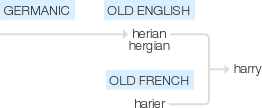Harry
Old English herian, hergian, of Germanic origin, probably influenced by Old French harier, in the same sense.
wiktionary
From Middle English herien, harien (compare Walloon hairyî, old French hairier, harier), from Old English herġian, from Proto-Germanic *harjōną (compare Saterland Frisian ferheerje, German verheeren(“to harry, devastate”), Swedish härja(“ravage, harry”)), from *harjaz(“army”) (compare Old English here, West Frisian hear, Dutch heer, German Heer), from Proto-Indo-European *koryos (compare Middle Irish cuire(“army”), Lithuanian kãrias(“army; war”), Old Church Slavonic кара(kara, “strife”), Ancient Greek κοίρανος(koíranos, “chief, commander”), Old Persian[script needed](kāra, “army”)). More at here(“army”).
etymonline
harry (v.)
Old English hergian "make war, lay waste, ravage, plunder," the word used in the Anglo-Saxon Chronicle for what the Vikings did to England, from Proto-Germanic *harjon (source also of Old Frisian urheria "lay waste, ravage, plunder," Old Norse herja "to make a raid, to plunder," Old Saxon and Old High German herion, German verheeren "to destroy, lay waste, devastate"). This is literally "to overrun with an army," from Proto-Germanic *harjan "an armed force" (source also of Old English here, Old Norse herr "crowd, great number; army, troop," Old Saxon and Old Frisian heri, Dutch heir, Old High German har, German Heer, Gothic harjis "a host, army").
The Germanic words come from PIE root *korio- "war" also "war-band, host, army" (source also of Lithuanian karas "war, quarrel," karias "host, army;" Old Church Slavonic kara "strife;" Middle Irish cuire "troop;" Old Persian kara "host, people, army;" Greek koiranos "ruler, leader, commander"). Weakened sense of "worry, goad, harass" is from c. 1400. Related: Harried; harrying.
Harry
masc. proper name, a familiar form of Henry. Weekley takes the overwhelming number of Harris and Harrison surnames as evidence that "Harry," not "Henry," was the Middle English pronunciation of Henry. Compare Harriet, English equivalent of French Henriette, fem. diminutive of Henri.
